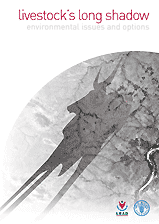According to a United Nations report published last November, animal agriculture emits more global-warming gases into the air than does transportation. And greenhouse gases aside, the report also shows how livestock degrade and pollute land and water sources. Livestock’s long shadow: environmental issues and options is a free, downloadable report that explains in great detail how the animal agriculture industry hurts the environment, which in turn makes it clear that eating meat products helps to contribute to the Earth’s demise. In the summary and conclusion chapter, the authors broke down their findings:

Economic, social, and health impact:
Although the livestock industry accounts for less than two percent of the world’s gross domestic product (GDP), its output is around 40 percent of all agricultural products. And in developed nations animal agriculture makes up 50-60 percent of all agricultural output. More important than its output, raising livestock provides livelihoods for people in developing countries, which is sometimes the only viable way the poor can live by. It has been shown that modest consumption of meat and dairy products can be beneficial for health. But the overconsumption of the same are to be blamed for obesity and its health-related problems, most notably in developed nations.
Environment, air, and water impact:
The animal agriculture industry takes up almost 30 percent of the Earth’s usable land space. Many countries, such as Brazil, have clear-cut, massive amounts of once abundant forests for the purpose of installing cattle farms. And the agricultural land used to raise feed for these cattle has been polluted by pesticides and fertilizers, as well as degraded by soil erosion and water pollution. The livestock sector is also a "key-player" in water use as well as depletion, which is mostly used to irrigate the crops used for feed. Grazing livestock disrupt natural chemical patterns in soil as well as destroy wild animal habitats. Ironically livestock consume more than 77 million tons of "human edible protein" as opposed to the 58 million tons the animals actually contribute to the food stream. The major pollutants from this industry include animal waste, hormones, and antibiotics, as well as chemicals used to produce leather. In addition, animal agriculture contributes 18 percent of the total effect of global warming. And in terms of greenhouse gases, livestock overall contribute 9 percent of carbon dioxide, a whopping 37 percent of methane gas, and 65 percent nitrous oxide.
Solutions:
Unless changes are made and implemented immediately, the report states bluntly that "environmental damage will double." Some solutions include taxing livestock companies for environmental damage as well as creating incentives for environmental upkeep. Implementing new technologies at a fast pace could create higher productivity and therefore impact the environment less. Requiring industrial livestock to be located in less concentrated areas where it’s easier to dispose their waste to neighboring croplands is another recommendation.
The impact of animal agriculture to the environment is already apparent, so being able to manage it in a way that benefits the producers, the consumers, and the environment is a problem that needs to be solved immediately. As a consumer, eating less meat is a small way to help.
keeping the earth ever green
- Follow us on Twitter: @inthefray
- Comment on stories or like us on Facebook
- Subscribe to our free email newsletter
- Send us your writing, photography, or artwork
- Republish our Creative Commons-licensed content

